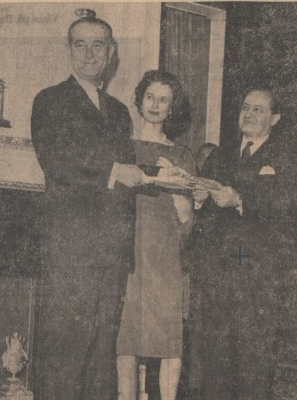Difference between revisions of "Hubert de Besche"
(desc) |
(unstub) |
||
| Line 1: | Line 1: | ||
{{person | {{person | ||
|wikipedia=https://en.wikipedia.org/wiki/Hubert_de_B%C3%A8sche | |wikipedia=https://en.wikipedia.org/wiki/Hubert_de_B%C3%A8sche | ||
| − | |description=Became [[Ambassador of Sweden to the United States]] two | + | |description=Became [[Ambassador of Sweden to the United States]] two years after being an observer at the [[1962 Bilderberg]]. |
|dbpedia=http://dbpedia.org/page/Hubert_de_B%C3%A8sche | |dbpedia=http://dbpedia.org/page/Hubert_de_B%C3%A8sche | ||
|wikidata=https://www.wikidata.org/wiki/Q5618543 | |wikidata=https://www.wikidata.org/wiki/Q5618543 | ||
|nationality=Swedish | |nationality=Swedish | ||
| + | |image=Hubert de Besche.png | ||
| + | |image_caption=From left: President [[LBJ|Johnson]], madam de Besche and Hugo de Besche as he presents his accreditation in Washington in 1964 | ||
|birth_date=7 July 1911 | |birth_date=7 July 1911 | ||
|birth_place= | |birth_place= | ||
| Line 18: | Line 20: | ||
|end=1973}} | |end=1973}} | ||
}} | }} | ||
| + | '''Hubert Wathier August de Besche''' was a Swedish diplomat and ambassador. He became [[Ambassador of Sweden to the United States]] two years after being an observer at the [[1962 Bilderberg]]. | ||
| + | |||
| + | ==Career== | ||
| + | de Besche, who was educated in law, was a senior civil servant. He was secretary at the Swedish-British-US war time trade negotiations 1943-45 trade representative in in [[Washington, D.C.]] 1952-53, Head of the Foreign Ministry's Commerce Department 1953–56 and Deputy Cabinet Secretary 1956–63.<ref>http://runeberg.org/vemardet/1969/0211.html</ref> | ||
| + | |||
| + | During his time as ambassador to [[Washington, D.C.]] (1964–73)<ref>https://cdnc.ucr.edu/cgi-bin/cdnc?a=d&d=VEST19640220.2.20&e=-------en--20--1--txt-txIN--------1</ref> there were increased diplomatic tensions between [[Sweden]] and the [[United States]]. After [[Olof Palme]]'s statement about the [[1972 Hanoi bombings]], in which he compared the US war in Vietnam and the Christmas bombings of Hanoi with, among other things, [[Nazi]] crimes during [[World War II]], de Besche was called to the US Deputy Secretary of State [[Alexis Johnson]] and received a heavy reprimand. Both de Besche and his then newly appointed successor, [[Yngve Möller]], were declared [[persona non grata]] in the United States. Given his bourgeois background, de Besche would probably personally have strongly disagreed with Palme's statement. [[John Guthrie]], the US ambassador to Stockholm, was called home at the same time. | ||
| + | |||
| + | de Besche then took up the post of ambassador in [[Copenhagen]] (1973-77). de Besche also chaired the seven-state negotiations that led to the creation of [[EFTA]] in [[1959]]. | ||
| + | |||
{{SMWDocs}} | {{SMWDocs}} | ||
==References== | ==References== | ||
{{reflist}} | {{reflist}} | ||
| − | |||
Latest revision as of 22:41, 16 April 2022
(fencer, diplomat) | ||||||||||
|---|---|---|---|---|---|---|---|---|---|---|
 From left: President Johnson, madam de Besche and Hugo de Besche as he presents his accreditation in Washington in 1964 | ||||||||||
| Born | 7 July 1911 | |||||||||
| Died | 11 March 1997 (Age 85) | |||||||||
| Nationality | Swedish | |||||||||
Became Ambassador of Sweden to the United States two years after being an observer at the 1962 Bilderberg.
| ||||||||||
Hubert Wathier August de Besche was a Swedish diplomat and ambassador. He became Ambassador of Sweden to the United States two years after being an observer at the 1962 Bilderberg.
Career
de Besche, who was educated in law, was a senior civil servant. He was secretary at the Swedish-British-US war time trade negotiations 1943-45 trade representative in in Washington, D.C. 1952-53, Head of the Foreign Ministry's Commerce Department 1953–56 and Deputy Cabinet Secretary 1956–63.[1]
During his time as ambassador to Washington, D.C. (1964–73)[2] there were increased diplomatic tensions between Sweden and the United States. After Olof Palme's statement about the 1972 Hanoi bombings, in which he compared the US war in Vietnam and the Christmas bombings of Hanoi with, among other things, Nazi crimes during World War II, de Besche was called to the US Deputy Secretary of State Alexis Johnson and received a heavy reprimand. Both de Besche and his then newly appointed successor, Yngve Möller, were declared persona non grata in the United States. Given his bourgeois background, de Besche would probably personally have strongly disagreed with Palme's statement. John Guthrie, the US ambassador to Stockholm, was called home at the same time.
de Besche then took up the post of ambassador in Copenhagen (1973-77). de Besche also chaired the seven-state negotiations that led to the creation of EFTA in 1959.
Event Witnessed
| Event | Location(s) | Description |
|---|---|---|
| Bilderberg/1962 | Sweden Saltsjöbaden | The 11th Bilderberg meeting and the first one in Sweden. |